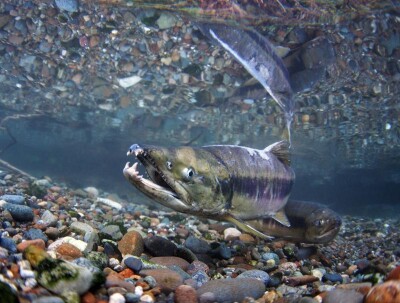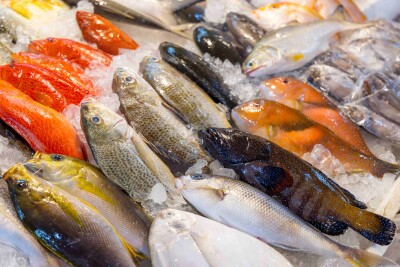NF January '79
One man survives tragedy of Marion A
By Nancy Freeman
"I kept saying over and over, 'I want to live. I choose life. I've got this far, I just want to make it.'"
And miraculously he did. Twenty nine-year-old fisherman Gerard Bourgeois survived a sinking boat, three hours in heavy seas and 12 days on a rocky shelf of beach.
Skipper Delno Oldham and fellow crewman Jerry Allain of Kodiak were lost at sea.
The men had left aboard the 42-foot F/V Marion A the afternoon of Oct. 1 to set crab gear south of Kodiak Island.
"The weather wasn't bad when we left," Gerard said later. At about 10:30 or 11 a.m. the next day, "We were right in Geese Channel when we started having trouble. We just started listing to port. It was really choppy. Tide rips and the waves were breaking from every direction.
"We were taking the sea head on... The list got real bad and we were way over to port. Water on the deck.
"Jerry and I were on top of the pots. I got down. I'm standing and Jerry hollers, 'Tell him to turn it into the sea.' So Delno turned into the sea but there was another sea still coming off the port side. Another big one...
"Then all of a sudden it started turning the other way. And when it turned it went way over — all the way over to starboard and it laid.
"About that time I hollered. 'Throw down the survival suits!' to Capt. Delno. He was at the wheel, trying to get the boat stable. I saw him throw up his hands and then the boat was underwater. He swam out through the door.
"We all hovered around the boat for a second and then it turned upside down. We were holding on to the bottom of the boat and trying to climb up. The waves were breaking over us and everybody was drinking salt water.
"Finally the boat started tilting, the stern kicked up in the air and she just sunk."
He figures only a minute and a half elapsed between the time the port list was severe and the Marion A went under.
After the boat sunk, Gerard pushed away and swam 20, 30 feet.
He recalls, "I saw Jerry. I didn't see Delno anymore. My head hit my [survival] suit. I didn't know it was out there..."
With Allain's help, Gerard managed to get into the suit. "I had to kick off my shoes and I just kept trying to get into it... Jerry was next to me, holding on to the foot of it for me. I said, 'Just let go for a minute; I'm going to go under water' ... which I did. I tilted my head back and kicked my legs up — kicked the seat of the suit up in the air. When I did that, my leg broke through and opened out the suit.
"I told Jerry to hold around my waist. He kicked while I kicked and swam. I told him to keep kicking.
"We were closer to the island side and I wanted to go that way but the wind was blowing us (in the opposite direction). Every time I tried to turn into it, Jerry would say, 'Just go with the tide, go with the wind.'
"Well, he only said it a couple times... Jerry slowed down. Started talking real slow. He knew it and I knew it: It was going to take too long to hit land.
"He said, 'I love you, Gerry.' I said, 'I love you, too.' He kissed me on the cheek and I kissed him on the cheek. I said, 'We're going to make this. Just keep kicking. Open your eyes.' I held him until he collapsed in my arms and then I held him longer. I was sure he was dead. I finally let go."
Gerard drifted slowly at an angle for two or three hours before he reached the rock and sand ledge of an island. "Of course I prayed, I prayed constantly," he says. "And I was begging. 'They say you're a merciful God, be merciful, I want to live.'"
The island he found had "no people, no trees, no bushes. Just low grass, tall grass and a little beach grass. Moles. Fox." But it had fresh water and Gerard used driftwood to build a shelter in the sand.
He had lost his glasses at sea and had difficulty scouring the beach for food. The first week he subsisted mostly on wild celery. "I ate mussels... and I found beach greens after six days." (Many times, he said, he had read a pamphlet in the Kodiak library about edible and poisonous plants.) His only supplies were two water-logged matches.
Weather was Gerard's biggest concern. "I knew the wind was going to get cold because I could see the snow on the mountains. It was almost the middle of October. This is Alaska. It was time for it to start freezing. That would have been the test. Luckily I didn't have to go through it.
"I couldn't have lived without that [Imperial survival] suit, I know it. I witnessed it, for one thing. I realized it each day. This thing was protecting me. There is no way I could have taken it off and been able to stay alive, especially in that wind."
His eventual rescue, Gerard says, was a miracle. Every day he pulled himself as far out on the reefs as he could, hoping to be spotted by a boat or airplane.
The second day, two airplanes passed overhead.
Coast Guard aircraft passed within a mile and a half of the area during the first week.
And, Gerard said, "When the [fishing] boats would go by, it looked like they just had to see me. Then they'd turn and head out. Every boat, I'd say, 'There will be another one, it's not hopeless,' but I was getting worried."
The morning of Friday, Oct. 13, Gerard included in his prayers one that went: "This is the 13th, you know. I've never had any lucky numbers. Let me have a lucky number, let this be my lucky day..."
Some 50 boats had already passed, he said. Then the Moonsong went by. "It hadn't seen me. Then I saw it get bigger instead of smaller. It had turned around and was coming right at me.
Ole Harder of Kodiak, owner and skipper of the Moonsong, said crewman Buddy Walton was looking through the glass when he spotted something red on the beach. At first Harder thought it was probably a red poly crab buoy. But he had the time, so he swung in. Walton said, "Hey, I think it's a man and he's waving."
("Buddy is a friend," Gerard said. "I hadn't seen him in four years.")
Harder radioed the Coast Guard, which sent a helicopter. The chopper first made a search of the area and then hoisted Gerard aboard. He was transported to Kodiak Island Hospital and treated for a fever and swollen and painful hands, legs and feet. He had lost 22 pounds.
By Oct. 17, Gerard was at the home of a friend in Kodiak, waiting for the weather to clear so he could fly to Covington, La., and rejoin his wife and young daughter.
Looking back over the ordeal, he said, "When we got into that type of sea, the boat didn't have the control it should and it happened so quickly. There wasn't any extra time.
"In that channel you could encounter those kinds of seas any time when the wind is blowing, depending on the tide. Geese Channel is a dangerous place to be running through and the weather can make it more dangerous.
''I'd have second thoughts about going down there on a bigger boat right now. Somebody could guarantee me a $50,000 crew share as soon as I stepped across, and I wouldn't.
''I'm giving up the idea of making money and catching fish for a while."
While Gerard Bourgeois credits the Imperial Survival Suit for saving his life, after 12 days in the garment he also had some other observations:
"If you have to spend some time in one," he said later, "the feet will tear up. There is no way to avoid it when you're walking across rocks.
"I was trying to be careful, but every time I'd climb out on one of those reefs to try and get further out into the water so a boat would have more of an advantage of seeing me, I'd tear holes (in the feet of the suit).
"The feet in it are just too flimsy," he said. "They should be reinforced. It should slip on like a shoe. That's what I am suffering from most right now: sore, aching and swollen feet."







